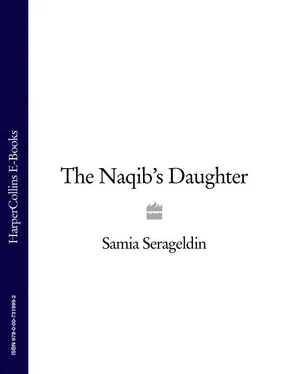‘Egyptians, they will tell you that I come to destroy your religion; it is a lie, do not believe it. Answer that I have come to restitute your rights, punish the usurpers; that I respect, more than the Mamlukes, God, his prophet Muhammad and the glorious Koran … Tell the people that we are true Muslims.’
‘Who translated this?’ Jabarti grumbled as he peered at the sheet in his hand, and continued reading.
Zeinab ventured a question. ‘My esteemed teacher, do you think these French are Muslim as they say?’
‘They say they agree with every religion in part, and with no religion in the whole, so they are opposed to both Christians and Muslims, and do not hold fast to any religion. In truth some hold their Christian faith hidden in their hearts, and there are some true Jews among them also. But for the most part they are materialists. They say the creed they follow is to make human reason supreme; each of them follows a religion which he contrives by the improvement of his own mind.’
Zeinab was distracted by a sudden swell of noise and ran to the window: a procession of dervishes and men in the robes of the Sufi orders were piping and drumming their way down the street. ‘Look, my teacher, they have brought down the Prophet’s banner from the Citadel!’
‘It is all done to calm the fears of the common people. Many were so alarmed they were prepared to flee, had the amirs not stopped them and rebuked them. The rabble would have attacked the homes of all the foreigners and Christians if the amirs had not prevented them; Sitt Nafisa and Sitt Adila took them into their houses.’
‘Surely the French will not reach Cairo?’ Zeinab was alarmed.
‘God alone knows. Murad Bey has had a heavy iron chain forged; it is stretched across the Nile at the narrowest point, to prevent the French ships from passing, while his own flotilla is moored below the chain. Ibrahim Bey and Murad Bey have assembled their troops and now sit in their respective camps across the river from each other, waiting for the French to arrive. Immovable as the Sphinx! Blinded in their arrogance!’ Suddenly aware of her alarm, the old man attempted to reassure her with a verse from the Koran: ‘Yet thy Lord would never destroy the cities unjustly, while as yet their people were putting things right. Amen.’
‘Amen,’ Zeinab repeated under her breath.
* * *
Nicolas Conté squinted in the sun as the Army of the Orient came to a halt along the western bank of the Nile and prepared to engage in the battle for Cairo. Ten thousand Mamlukes faced them on horseback, in full battle regalia, turbaned or helmeted, blazing in the sun with their muskets and lances, their splendid Arabians as richly caparisoned as the riders. The commanders flew back and forth along the lines, turning and wheeling their mounts on a hair, and brandishing their glittering sabres at the heavens.
‘There can be no finer animal than a Mamluke-trained horse,’ Dr Desgenettes observed, reining in his mount abreast with Nicolas.
‘A brave sight indeed,’ Conté concurred. ‘Let us take a moment to admire them before we cut them to pieces.’ He spoke with more bravado than he felt; the siege of Alexandria had been harder than anyone had anticipated, but it was the terrible, four-day forced march south across the desert with its sun of lead and its intolerable heat that had sapped every man’s strength and spirit. And the Bedouin! Even the most romantic among the French, thought Nicolas, even Geoffroy St-Hilaire, had lost all illusion about Rousseau’s Noble Savage. Like vultures, the Bedouin hovered on the horizon, ready to swoop down on stragglers who succumbed to heat, thirst, sunstroke or despair. There were many among the troops who took their own lives.
But now the ordeal of the desert march was behind them, and the great Army of the Orient was camped before the Nile at Imbaba in preparation for the Battle of the Pyramids, as Bonaparte referred to it.
‘Can one even see the pyramids from here?’ Dr Desgenettes remarked wryly to Nicolas. ‘But I admit it sounds a good deal more memorable than the Battle of Imbaba; our general ever has his eye on the history books.’
Ah yes, thought Conté, but what the history books would record about the French expedition to Egypt was yet to be written. Would this battle go down as the great triumph of the Army of the Orient? And what of his own epitaph, Nicolas-Jacques Conté, Chief Engineer and Commander of the Balloonist Brigade? Would it say that he had survived to see his native shore again one day, to be reunited with his sweet Lise, and his three children? He was a true son of the Revolution and the Republic, and as such he was not a praying man, but at times like these he almost wished he had faith.
‘Soldiers!’ Bonaparte raised his arm and every ear strained to hear him. ‘Go, and think that from the height of these monuments forty centuries observe us.’
At these words a great shout rang from the ranks and Nicolas’ heart leapt in his chest. As if at the signal, the Mamluke cavalry charged at a full gallop against the stationary and unshakeable square formation of the French infantry. The fantassins held their ground with supernatural discipline till at twenty paces Bonaparte gave the order to fire cannon and musket, and the first wave of the fine cavaliers fell. Amazingly, the next wave charged right behind them, but the carré held again, and the cannon fired again from the corners, and the Mamlukes were cut down again, and this went on until those that survived threw themselves in the river and tried to swim back to the opposite shore, where their confreres were massed, helpless to come to their succour. The French then turned their fire on the eastern bank.
Elfi felt the horse buckle under him as it was hit, and leapt free of the saddle before the beast hit the ground. It was the third horse that had been shot out from under him in this battle. As he landed, the bodies of men and horses beneath him broke his fall, and he lay motionless, concussion blanking out his mind.
When his senses returned, he knew time had passed, but he did not know how long. Hours? Minutes? It was dark. The din of the cannon had abated somewhat and seemed further off, as if directed at the eastern shore; or perhaps the blood in his ears and eyes was dulling his perception. He was bleeding profusely from his head, but head wounds tended to bleed disproportionately; he worried more about the wounds to his right hand and his thigh. He was in no immediate agony, so he did not think he had broken any bones. His sense of smell was undiminished, and the stench of the slaughterhouse made him retch; in all his years, he had not experienced carnage on such a massive scale.
Then he heard them – the buzzards who circled after any battle, come to pick the corpses clean of booty. If they found him alive, they would kill him. If he played dead, they would cut off his fingers for the rings, slash off his ears, then kill him anyway. He began to crawl on knees and elbows over the corpses, towards the river that was now a blazing lake of fire. Either the French had set light to Murad’s river flotilla, or Murad himself had given Papas Oglu the order to burn his ships as they retreated. As Elfi watched, the fire reached the gunpowder magazines and before his eyes the ships exploded like a thousand fireworks, sailors throwing themselves into the river in a bid to escape. Still, he slithered on his belly over the foul, blood-slick matting of human and animal dead and dying, towards the flaming water.
He did not look at the bodies he crawled over. Some of the fallen may have been his khushdash, men he had grown up with, like Tambourji and Bardissi … or they may have been his own Mamlukes and kashifs, boys he had raised to manhood, trained, manumitted, married to his slave girls and set up in fine houses. Elfi did not spare them a downward look or a moment’s prayer; there would be time for mourning, later – if he survived.
Читать дальше












